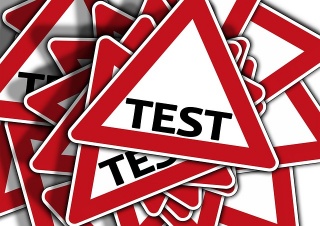The questions which follow provide a basic knowledge test of selected concepts covered in this learning pathway:
Web literacy for fact-checking.
The questions published at the end of each learning pathway are re-used for the knowledge test for learners interested in earning a digital badge or certificate of participation for the Critical Media Literacies and Associated Digital Skills (LiDA104) micro-course. Please consult the Certify participation page for more information.
Indicate whether the following statements are true or false:
- A biography is an example of a primary source of information.
- True
- No. This is a secondary source, because it is not written by the person who is the subject of the biography. (Autobiography is a primary source, however.)
- False
- Google Books is a good starting point for checking the real source of quotations.
- True
- Yes. This can be a useful tool.
- False
- No. Google Books can be a useful tool for this purpose.
- Spoke.com is well-respected fact-checking site.
- True
- No. Check again what the real name of the fact-checking website is - it is similar to this.
- False
- Well-spotted. The real name of the website is snopes.com.
- You can use images as the search object on Google to find the image's source online or similar images.
- True
- False
- No. This is one of the recommended ways of 'going upstream' discussed in this learning pathway.
Multiple choice questions
- Which of the following is a SECONDARY source of information? (Select one.)
- Eye-witness account recorded in a diary
- No, this is a primary source. Look back at the ‘Go Upstream’ page to find out why.
- Academic article presenting the findings of a research project
- No, this is a primary source. Look back at the ‘Go Upstream’ page to find out why.
- Academic journal article commenting on someone else’s scientific research
- Yes, this is a secondary source.
- A piece of creative writing
- No, this is a primary source. Look back at the ‘Go Upstream’ page to find out why.
- Which of the following are generally regarded as reputable fact-checking sites? (Tick all that apply - there are two correct answers.)
- Politifact
- Yes, this is fact-checking site for US news.
- FactsCan
- Yes, this is a fact-checking site relating to Canadian federal politics.
- GlobalVoices
- No, this is a news site for citizen journalists, not a fact-checking site.
- Truth Facts
- No, this is a humorous site.
- Which of the following is an example of ‘sponsored content’? (Select one.)
- A newspaper pays a news agency for the right to publish the agency’s article on the newspaper’s website
- No - this is an example of syndication, a service provided by news agencies.
- A company pays a newspaper to place a link on the newspaper’s website, linking to an article that directly or indirectly promotes the company’s products
- Yes, this is an example of sponsored content - which should be labelled as such on the web page.
- A newspaper’s review of a particular product
- No. This is not ‘sponsored content’, as it is the newspaper’s own article, not a link to the work of an outside organisation. (However, the newspaper may have received some benefit for writing the article - for example a free holiday for a journalist reviewing a resort. Reputable newspapers should declare these benefits.)
- A large advertisement for an airline, next to a genuine newspaper article about the benefits of foreign travel
- No. The airline may have paid a lot of money to have their advertisement in such a prominent position, but it is only ‘sponsored content’ if the advertisement itself gives the appearance of being a newspaper article.
- You can check for web page changes and disappearances over time using which of the following tools? (Tick one.)
- Google Snippets
- That’s not right. Look back at the ‘Google tips’ page to learn more about Snippets.
- Google Scholar
- That’s not right. Look back at the ‘Google tips’ page to learn more about Google Scholar.
- A domain search
- That’s not right. Look back at the ‘Read laterally’ page to learn more about domain searches.
- The Wayback Machine
- Yes, you’re right. This is run by the Internet Archive.
